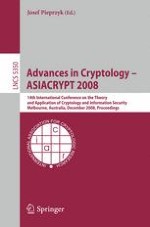
2008 | OriginalPaper | Buchkapitel
MPC vs. SFE : Unconditional and Computational Security
verfasst von : Martin Hirt, Ueli Maurer, Vassilis Zikas
Erschienen in: Advances in Cryptology - ASIACRYPT 2008
Verlag: Springer Berlin Heidelberg
Aktivieren Sie unsere intelligente Suche, um passende Fachinhalte oder Patente zu finden.
Wählen Sie Textabschnitte aus um mit Künstlicher Intelligenz passenden Patente zu finden. powered by
Markieren Sie Textabschnitte, um KI-gestützt weitere passende Inhalte zu finden. powered by
In secure computation among a set
$\mathcal{P}$
of players one considers an adversary who can corrupt certain players. The three usually considered types of corruption are active, passive, and fail corruption. The adversary’s corruption power is characterized by a so-called adversary structure which enumerates the adversary’s corruption options, each option being a triple (
A
,
E
,
F
) of subsets of
$\mathcal{P}$
, where the adversary can actively corrupt the players in
A
, passively corrupt the players in
E
, and fail-corrupt the players in
F
.
This paper is concerned with characterizing for which adversary structures general secure function evaluation (SFE) and secure (reactive) multi-party computation (MPC) is possible, in various models. This has been achieved so far only for the very special model of perfect security, where, interestingly, the conditions for SFE and MPC are distinct. Such a separation was first observed by Ishai
et al.
in the context of computational security. We give the exact conditions for general SFE and MPC to be possible for information-theoretic security (with negligible error probability) and for computational security, assuming a broadcast channel, with and without setup. In all these settings we confirm the strict separation between SFE and MPC. As a simple consequence of our results we solve an open problem for computationally secure MPC in a threshold model with all three corruption types.